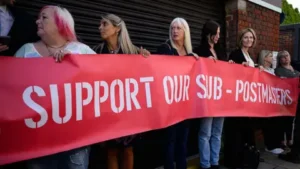In a recent confrontation igniting debates over military leadership and gender, Richard Tice, the deputy leader of Reform UK, has been squarely criticized by Louise Jones, the Labour MP for North East Derbyshire. This clash emerged following Tice’s disparaging remarks about Group Captain Louise Henton, a female commanding officer at RAF Brize Norton, amidst a serious security breach at the base in Oxfordshire. The incident has sparked dialogue surrounding workplace dynamics, gender roles in the military, and the implications of such public criticisms.
The situation escalated when Tice took to social media platform X to dismissively refer to Group Captain Henton, stating, “Kept safe & secure by an HR manager… well done folks.” This comment raised eyebrows and was perceived as a slight against Henton’s capabilities as a military leader, particularly in light of her responsibilities following the breach. In the aftermath of Tice’s remarks, Jones did not mince words. She labeled his words as “pathetic” during parliamentary discussions, underlining the insensitive nature of public criticism against female leaders in traditionally male-dominated fields like the armed forces.
Jones, who has her own military background as a veteran who served in Afghanistan, advocated for recognizing the achievements of women in military roles. She emphasized that every promotion and position earned by women in the armed forces resulted from evident dedication and hard work. Jones articulated that women in the military often feel additional pressure to be flawless, as any missteps by one female soldier reflect on others, thus making their path to leadership even more challenging.
Tice quickly responded to the outcry, suggesting that the real issue at hand was the appointment of an HR manager in a security role at an essential UK military base. He characterized the criticisms from Jones and her colleagues as emblematic of “woke weakness” within political circles, further fueling tensions between the parties involved. Tice framed the discussion not solely around gender but rather as an indictment of what he perceives as a broader failure in security management at military installations.
Meanwhile, the incident that triggered this debate involved members of the Palestine Action group infringing on the security protocols at RAF Brize Norton. They gained unauthorized access to the base and proceeded to vandalize military assets, further complicating the narrative around security breaches. The police have launched an investigation into this incident, indicating the seriousness of the security concerns raised.
Group Captain Henton, who assumed command of RAF Brize Norton in July 2024, has had a commendable career, entering the RAF in 2001 and having held numerous leadership positions. The Ministry of Defence maintained that they have confidence in her leadership despite public discontent over Tice’s remarks. A source within the MoD expressed admiration for Henton’s capabilities, describing her as a significant figure in military leadership roles, successfully integrating personnel management and operational duties throughout her career.
The ripple effect of this controversy reached other political figures, including Cameron Thomas, the Liberal Democrat MP for Tewkesbury. He openly condemned Tice’s criticism of Henton, referring to it as a “disgusting attack” against a senior officer. His comments align with the growing concern regarding the treatment of women in the military and the need for productive dialogue surrounding gender equality within the armed forces.
The discussions instigated by this incident point to the increasingly complex intersection of gender, leadership, and national security within the UK military framework. As debates continue, the spotlight remains on how military leadership can evolve to ensure inclusivity, while also maintaining security and operational integrity within the armed forces.











